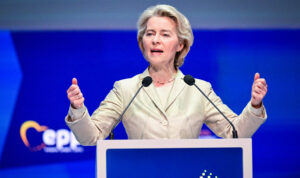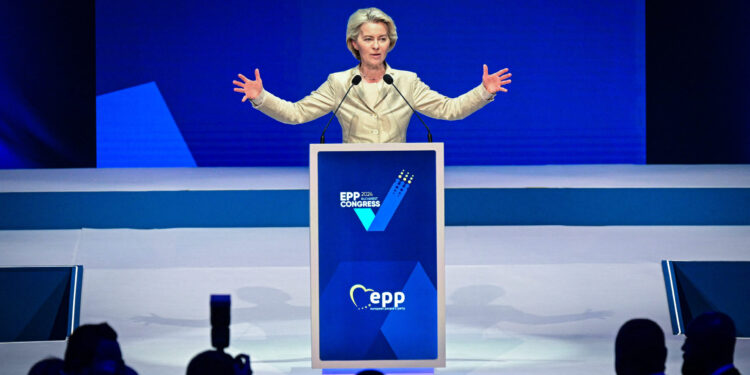Brussels – “Migration has always been a fact for Europe, and it always will be; over the centuries, it has defined our societies, enriched our cultures and shaped many of our lives. And this will always be the case.” To reread today the words with which Ursula von der Leyen opened the press conference presenting the Migration and Asylum Pact on September 23, 2020, seems to be dealing with another president of the European Commission. In less than three and a half years, when the current parliamentary term is almost drawing to a close, the narrative on migration has completely changed. Now the German politician does not seem to have a moment’s hesitation when, as the newly elected Spitzenkandidatin of the European People’s Party, she vehemently claims that “we Europeans decide who comes to Europe and under what circumstances, not the criminal trafficking organizations.”

In her speech at the Bucharest Congress today (March 7) in her new capacity as the EPP’s joint candidate for the European elections in June, von der Leyen showed for the first time in an overt way that she has embraced the conservative and securitarian approach of the President of the European People’s Party, Manfred Weber. Speaking precisely about the now nearing completion at the legislative level of the Migration and Asylum Pact, von der Leyen cited only the fact of having “strengthened European borders” and especially that “we will continue to do so.” An indication of how the migration policy of a second von der Leyen commission might develop, given the fact that, in this narrative, there’s not the slightest hint of that “reasonable balance between responsibility and solidarity among member states” in the management of the phenomenon—which instead formed the basis of the approach at the beginning of the mandate. “It is not a question of whether member states should support with solidarity and contributions, but how to do it,” was the appeal of a von der Leyen only three years younger.
Undoubtedly playing no small role is the fact that von der Leyen today is no longer only President of the EU Commission but also an EPP candidate to succeed herself for another five years. In this election campaign, the European People’s Party is also trying to fish in the vote pool of the conservative right, from the Green Deal to migration, precisely.
However, this does not make the focus on external border management alone any less perplexing, as does the sharing of an Election Manifesto that, on the issue of migration, stands in clear discontinuity with her own current EU executive.
Among her thanks to European heads of state and government expressions of parties affiliated with the EPP, the new Spitzenkandidatin cited the Lithuanian premier, Ingrida Šimonytė, “for fighting Lukashenko’s instrumentalization of migration” (including through the construction of border barriers) and the Austrian chancellor, Karl Nehammer, “for fighting illegal migration and strengthening the Union’s external borders.” There is no mention of receiving incoming migrants or solidarity among member countries to bear the costs and management.
In this context of an officially started election campaign, it is almost impossible to distinguish where the President of the European Commission begins and where the Spitzenkandidatin of the EPP, especially when von der Leyen states that “we have a fantastic Manifesto, it’s time to convince the people.” The Manifesto of the European People’s Party is, at the moment, as far as the centre-right family could express with respect to the migration policy pursued by the current EU executive. The text (as yet unpublished) states that the centre-right family could express with respect to the migration policy pursued by the current EU executive. The text (as yet unpublished) states that “we are in favour of a fundamental change in European asylum legislation,” despite the fact that the very EU legislation on the subject is ready to be reformed after years of inconclusive discussions and clashes. The change advocated by the EPP is one whereby the EU and its member states must have “the right to decide who and where to grant” asylum. It is the “where” that is to be emphasized: “Any person seeking asylum in the EU could be transferred to a safe third country and undergo the asylum procedure. If successful, the safe third country will grant protection to the applicant there.” This is the so-called “Rwanda model” outlined in recent years by the UK and sharply criticized by the current European Commission, with the addition of “annual humanitarian quotas of vulnerable individuals” to be granted international protection. Von der Leyen’s only comment on the matter was that “the concept of a third country is already established in European law; procedures must take place based on the Geneva Convention and the European Convention on Human Rights.” Although the Manifesto points out that they “do not provide for the right to freely choose the country of protection.”
Three years of changing course on migration
It is not only the election campaign that has changed von der Leyen’s narrative on migration policy. If one analyzes the main steps of the last three and a half years of European policy, one can easily realize how the change from a balance between solidarity and responsibility to an almost only securitarian and border defence approach has been slow but steady. Even as late as the fall of 2021—when the most pressing issue for the Union was the so-called “instrumentalization of migration” by the self-proclaimed President of Belarus, Alexander Lukashenko—von der Leyen rejected Weber’s idea of funding border barriers with EU funds, though she justified the choice on the grounds that “a hybrid attack is underway against the EU by an authoritarian regime to destabilize neighbouring democracies, not a migration crisis.”
Between the end of 2022 and the beginning of 2023, the theme of strengthening external borders began to be more strongly perceived, with a pre-European Council letter a year ago creating quite a bit of controversy over the “mobilization of EU funds to support member states to strengthen border control capacities and infrastructure.” This was a reference to a range of infrastructure (such as border patrol roads, border guard stations, and surveillance systems) that can already now be financed with EU funds. Although this was not an opening to the use of the Union’s budget for the construction of walls, the confusion created in that circumstance by von der Leyen demonstrated the real crux of the matter: rather than technical, the current EU Commission’s opposition is set on the level of interpretation of the Union’s founding Treaties, more specifically the principle of non-refoulement enshrined in article 78 of the TFEU. In other words, up to now, the construction of border walls could constitute a case of pushback (illegal refoulement of people with a right to international protection at the EU’s borders), according to an informal understanding between the Commission and the majority in the EU Parliament at the beginning of the legislature. Still, it is not sure that this interpretation could not change after the June elections.

From left: the President of the European Commission, Ursula von der Leyen, and the Italian Prime Minister, Giorgia Meloni (credits: Ludovic Marin / Pool / Afp)
Finally, in this context there is to be considered the gradual rapprochement of von der Leyen with the Italian Prime Minister and President of the Party of European Conservatives and Reformists, Giorgia Meloni, also in a post-electoral perspective for the nomination of the EU Commission presidency by the 27 heads of state and government at the European Council. Among the various contacts between the two leaders in the year and a half of Meloni’s government, it is worth mentioning the March 2023 letter exchange after the Cutro shipwreck: in the response of the chairwoman of the EU executive appeared for the first time that “holistic” approach also based on “combating criminal smuggling networks”. A preview of that simplistic analysis of such a complex subject as migration—espoused a securitarian view of the management of the phenomenon—showed during the visit to Lampedusa in September last year: “An increasing number of migrants are leaving their countries of origin; they are lured by unscrupulous traffickers and smugglers,” von der Leyen asserted at the time, suggesting that human traffickers are the only variable to be taken into account, and abandoning any reference to the fact that “over the centuries migration has defined our societies, enriched our cultures and shaped many of our lives.” As President von der Leyen herself claimed less than three and a half years ago, she now claims the new slogan of recent months “We decide who enters Europe, not the traffickers.”
English version by the Translation Service of Withub





